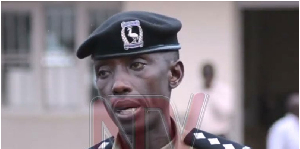- Home - News
- TWI News | TV
- Polls
- Year In Review
- News Archive
- Crime & Punishment
- Politics
- Regional
- Editorial
- Health
- Ghanaians Abroad
- Tabloid
- Africa
- Religion
- Election 2020
- Coronavirus
- News Videos | TV
- Photo Archives
- News Headlines
- Press Release
General News of Thursday, 28 June 2012
Source: --
NDC Blamed For Economic Hardships, Fall In Cedi
The economic committee of the New Patriotic Party says the mismanagement of the country’s economy by the Mills-Mahama NDC administration in its 3½ year rule is the sole cause of the rapid depreciation of the Ghana cedi and its attendant hardships imposed on Ghanaians.
In a press statement read by Yaw Osafo Maafo, Chairman of the NPP economic committee, he stated that rapid depreciation of the cedi under the current administration has not only had a negative effect on the economy, but has also caused massive increase in the cost of living for the average Ghanaian.
According to Yaw Osafo Maafo, the spiraling rise in the cost of living evident in the daily rise in the prices of goods and services on the market “is the result of the NDC government's inability to keep the currency stable.”
“The government appears to be totally lost as to how to resolve this problem, while prices of goods and services keep rising by the day! This makes untenable the reported single digit inflation as there seems to be a disjoint between cost of goods and the inflation rate,” the NPP man said.
Yaw Osafo Maafo cited the basic supply and demand for foreign currency, trade imbalances, inflation, interest rates and the loss of confidence in a country’s economy as factors which influence the exchange rate of currencies.
Touching on Ghana’s trade imbalances he explained that Ghana as at 2011 had a trade deficit of some GH¢2.5 billion. This imbalance, according to Yaw Osafo Maafo, creates a shortfall which affects the value of the cedi, warning that once “our trade imbalances persist we expect the cedi depreciation to continue.”
On Inflation, the NPP finance guru explained that higher inflation figures would normally erode the value of a country’s currency and will result in citizens keeping foreign currencies. He added that a country with a lower and stable inflation will, however, expect a relatively stable exchange rate.
He was therefore at a loss as to why Ghana, with a reported low and stable inflation for eighteen months was witnessing a rapid depreciation of the Ghana cedi in recent months.
Similarly with regards to interest rates, Yaw Osafo Maafo maintained that countries with higher interest rates normally expect capital inflows from countries with lower interest rates, resulting in the appreciation of the currency in the country whose interest rates are higher because of the implied increased demand for that country’s currency.
“This will normally result in an appreciation of the Interest rates in Ghana are currently quite high (91 day Treasury Bill is about 21%). Under this condition one will have expected foreign capital to flow in Ghana to take advantage of this high interest rate. If this were to occur, it should result in an appreciation of the cedi. However the observed current rapid depreciation of the cedi tells a different story. Why is this the case?” he wondered.
Ghanaian’s according to Yaw Osafo Maafo, have lost confidence in the economy because of the NDC’s record of poor governance, eroding credibility in state institutions, fiscal excesses in an election year and the saga of fraudulent payments of “judgement debts” to political cronies.
“When such incidents occur it leads to loss of confidence in the economy by both resident and non-residents. Non-residents react by not bringing their investments into Ghana for fear of not receiving fair justice, while residents react by moving their assets out into foreign assets. The cumulative effect is a decrease in the supply of foreign currencies and hence a depreciation of the local currency”, the NPP man added.
The effect of the depreciation of the cedi, Yaw Osafo Maafo, said has serious effects on all key economic actors namely businesses, households and government, and the NDC has been poor at managing the exchange rate and for that matter the cedi during its tenure in office
“Lest we forget, in the year 2000 the cedi lost its value as rapidly as it is doing today,” he added. Yaw Osafo Maafo urged the electorate to vote for vote for the able leadership of Nana Addo Dankwa Akufo-Addo and Dr. Mahmud Bawumia in the December polls, assuring Ghanaians that “an NPP government will ensure that the exchange rate is kept relatively stable as was done before.”










